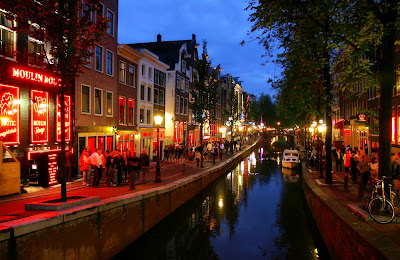 |
| Amsterdam Red Light District |
The Red Light District
Amsterdam's Red Light District existed since the 14th century and formerly this area contained many factories and distilleries, mainly catering to soldiers and sailors. By the end of the 17th century, the shipping industry was getting busier in Amsterdam and high-class brothels flourished.
The Sex Industry
When the French emperor Napoleon ruled the Netherlands in the early 19th century, all the women who worked as a prostitute had to have twice a week a health check to ensure they didn't pass diseases such as syphilis to sailors and soldiers. In the beginning of the 20th century, the Dutch government banned brothels, but prostitution continued using different businesses like bathhouses and massage parlors as a cover. After this it became apparent that new laws couldn't banish the sex industry. The Dutch government allowed prostitutes to continue their trade as long as they didn't solicit in doorways. This is the reason how the window trade began, as women now beckoned clients from behind openings in red curtained windows on the streets.
The Red Light District tolerated since 1960's
Since the 1960's the Dutch government tolerated the Red Light District sex industry with the red windows and sex entertainment and became a important tourist attraction in Amsterdam. Nowadays there are strict local laws for brothel operation. Trafficking and exploitation are increasingly addressed. Each year about twenty persons convicted by the Amsterdam court. Despite what you may have heard, the Red Light District is actually a very safe place to visit, as is the whole of the city today. Unlike other major European cities, Amsterdam has a general live and let live attitude that extends to personal safety in the streets too. You should however take care of your valuables at all times, beware of pickpockets!
Sex Theaters, coffeeshops and women in the Red Light District
Besides the window prostitutes can be found various sex theaters with live acts and striptease shows with Amsterdam's most famous and certainly largest night club Casa Rosso. But also peepshows, a sex museum and cannabis museum and also many coffee shops where soft drugs are sold legally. But there is much more to see in the Red Light District, the very picturesque Zeedijk ending on the amazing Nieuwmarkt Square, the Jewish quarter, Waterloo Square lie just around the corner. Being one of the oldest parts of Amsterdam, it has a lot to offer for tourists, beautiful architecture, like the gothic Old Church. Vibrant Chinatown with chinees restaurants, shops and a beautiful temple, a fresh produce market on Nieuwmarkt Square every Sunday.
Prostitution is legal in the Netherlands
 |
| This map shows Amsterdam in 1649, the streets in the Red Light District area are almost the same nowadays. The Red Light District has been marked in red. |
Information Canal cruises Amsterdam
ibis Amsterdam Centre
Amsterdam hotel tip:
ibis Amsterdam Centre
Amsterdam City Centre, Amsterdam – Metro access
Hotel ibis is located in Amsterdam's Old Town, close to the main railway station with all forms of public transport and just a 10-minute walk from Dam Square. A very nice location to explore the city. A very good breakfast is served every morning in the breakfast room and this 3-star hotel has non-smoking rooms. Directly in the area there is a large choice of bars and restaurants. Free Wi-Fi is available in the rooms and in all public areas.
More information ibis hotel Amsterdam
More information ibis hotel Amsterdam

